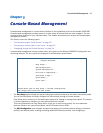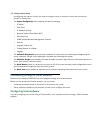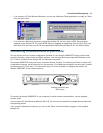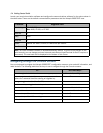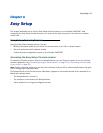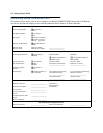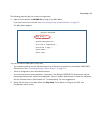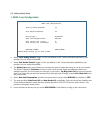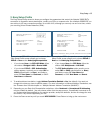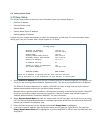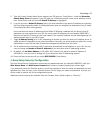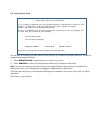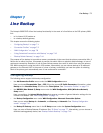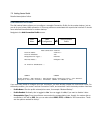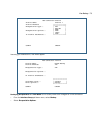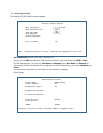
Easy Setup 6-5
2. Easy Setup Profile
The Easy Setup Profile screen is where you configure the parameters that control the Netopia 3366C-ENT’s
connection to a specific remote destination, usually your ISP or a corporate site. On a Netopia 3366C-ENT you
can add up to 15 more connection profiles, for a total of 16, although you can only use one at a time, unless
you are using Virtual Private Networks (VPNs).
1. To enable address translation, toggle Address Translation Enabled to Yes (the default). You need not
change this unless you have a specific reason. For more information on Network Address Translation, see
the Firmware User’s Guide chapter on “Multiple Network Address Translation (MultiNAT)“.
2. Depending on your Data Link Encapsulation selections, either Numbered or Unnumbered IP Addressing
may be enabled by default. (You may choose either from the pop-up menu, if specifically instructed to do
so.) Unless otherwise specified by your service provider, accept the defaults, and do not change the next
two values. They will be supplied by your ISP.
3. Press the Down arrow key until you reach NEXT SCREEN. Press Return to bring up the next screen.
Connection Profile 1: Easy Setup Profile
+--------------+
Underlying Encapsulation... +--------------+
RFC1483 Mode... | Bridged 1483 |
| Routed 1483 |
+--------------+
Address Translation Enabled: Yes
IP Addressing... Numbered
Local WAN IP Address: 0.0.0.0
Local WAN IP Mask: 0.0.0.0
PREVIOUS SCREEN NEXT SCREEN
Connection Profile 1: Easy Setup Profile
Underlying Encapsulation... None
PPP Mode... VC Multiplexed
PPP Authentication... None
Address Translation Enabled: Yes
IP Addressing... Numbered
Local WAN IP Address: 0.0.0.0
Local WAN IP Mask: 0.0.0.0
Remote IP Address: 127.0.0.2
Remote IP Mask: 255.255.255.255
PREVIOUS SCREEN NEXT SCREEN
Enter basic information about your WAN connection with this screen.
If you selected RFC1483 in the previous screen, the
Easy Setup Profile screen allows you to choose
PPPoE or None as the Underlying Encapsulation.
• If you choose None, the RFC1483 Mode offers
the choice of Bridged 1483 or Routed 1483.
• If you choose PPPoE, a PPP Authentication
option appears, to permit you to select PAP or
CHAP authentication (or None), and fields to
enter PAP User Name and Password, or CHAP
Host Name and Secret.
If you selected PPP in the previous screen, the Easy
Setup Profile screen allows you to choose PPPoE or
None as the Underlying Encapsulation.
• If you choose None, the PPP Mode offers the
choice of VC Multiplexed or LLC SNAP.
• The PPP Authentication option permits you to
select PAP or CHAP authentication (or None),
and fields to enter PAP User Name and
Password, or CHAP Host Name and Secret.



